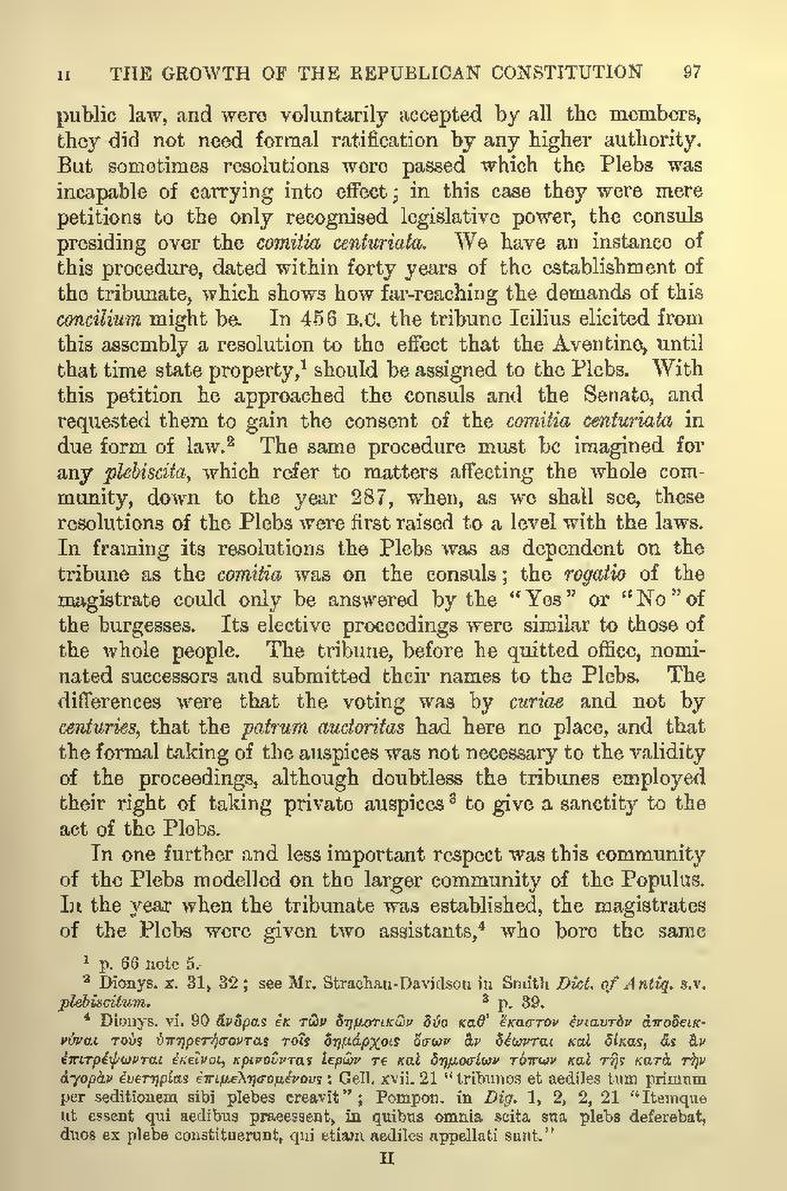public law, and were voluntarily accepted by all the members, they did not need formal ratification by any higher authority. But sometimes resolutions were passed which the Plebs was incapable of carrying into effect; in this case they were mere petitions to the only recognised legislative power, the consuls presiding over the comitia centuriata. We have an instance of this procedure, dated within forty years of the establishment of the tribunate, which shows how far-reaching the demands of this concilium might be. In 456 B.C. the tribune Icilius elicited from this assembly a resolution to the effect that the Aventine, until that time state property,[1] should be assigned to the Plebs. With this petition he approached the consuls and the Senate, and requested them to gain the consent of the comitia centuriata in due form of law.[2] The same procedure must be imagined for any plebiscita, which refer to matters affecting the whole community, down to the year 287, when, as we shall see, these resolutions of the Plebs were first raised to a level with the laws. In framing its resolutions the Plebs was as dependent on the tribune as the comitia was on the consuls; the rogatio of the magistrate could only be answered by the "Yes" or "No" of the burgesses. Its elective proceedings were similar to those of the whole people. The tribune, before he quitted office, nominated successors and submitted their names to the Plebs. The differences were that the voting was by curiae and not by centuries, that the patrum auctoritas had here no place, and that the formal taking of the auspices was not necessary to the validity of the proceedings, although doubtless the tribunes employed their right of taking private auspices[3] to give a sanctity to the act of the Plebs.
In one further and less important respect was this community of the Plebs modelled on the larger community of the Populus. In the year when the tribunate was established, the magistrates of the Plebs were given two assistants,[4] who bore the same: Gell. xvii. 21 "tribunos et aediles tum primum per seditionem sibi plebes creavit"; Pompon. in Dig. 1, 2, 2, 21 "Itemque ut essent qui aedibus praeessent, in quibus omnia scita sua plebs deferebat, duos ex plebe constituerunt, qui etiam aediles appellati sunt."]
- ↑ p. 66 note 5.
- ↑ Dionys. x. 31, 32; see Mr. Strachan-Davidson in Smith Dict. of Antiq. s.v. plebiscitum.
- ↑ p. 39.
- ↑ Dionys. vi. 90 [Greek: andras ek tôn dêmotikôn duo kath' hekaston eniauton apodeiknynai tous hypêretêsontas tois dêmarchois hosôn an deôntai kai dikas, has an epitrepsôntai ekeinoi, krinountas hierôn te kai dêmosiôn topôn kai tês kata tên agoran euetêrias epimelêsomenous
